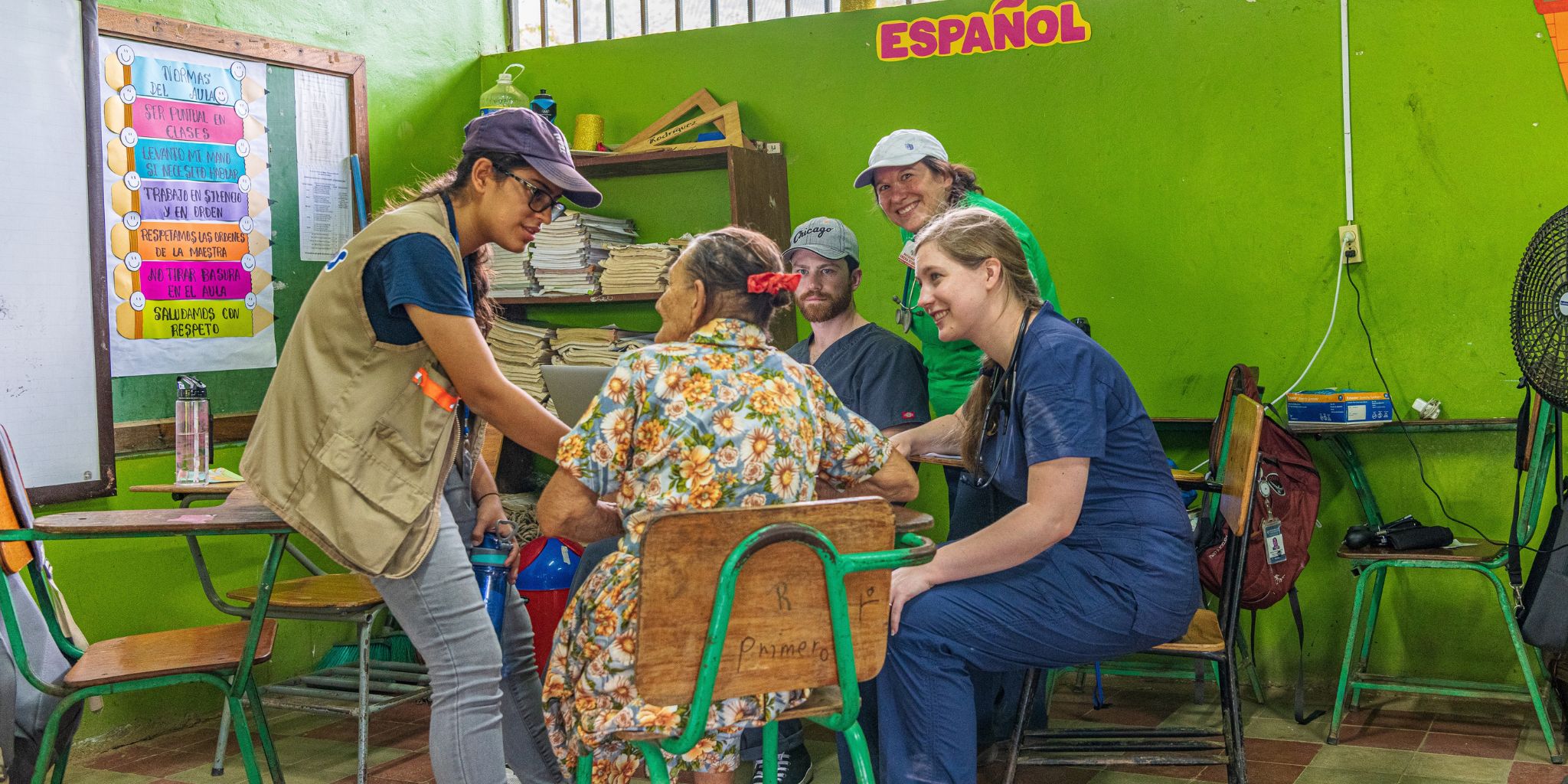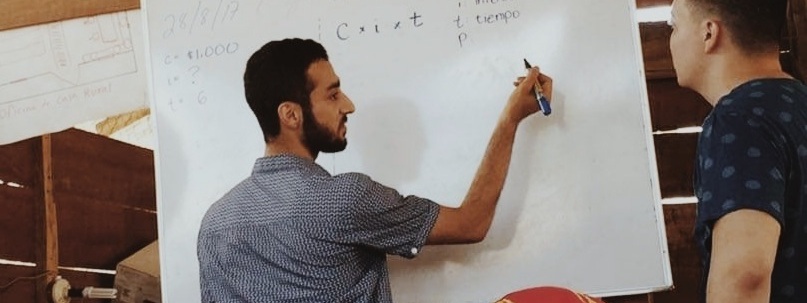Voluntourism, a fusion of volunteering and tourism, can sound ideal for travelers who want to make a positive impact on their next international trip.
This kind of travel comes with complexities that aren’t always obvious when you first inquire about volunteering with an organization. Some programs spend significant time and resources to build sustainable, ethical programs for the communities they partner with.
But sadly, many organizations are harmful to the communities they promise to support. Some non-profits develop programs around what will feel “good” to volunteers for a week or two, leaving members of the local community in a worse condition than the one they started in.
It’s important to understand your potential impact and seek out organizations that truly offer meaningful experiences on both sides of the exchange.
What Is Voluntourism?
Voluntourism is a term used to describe travel that includes some form of charity work or volunteering, often done in the midst of traditional tourist activities.
What is the difference between volunteering and voluntourism? The difference between volunteering and voluntourism is the addition of travel. Volunteering can happen anywhere. Voluntourism involves travel to a volunteer site for both short- or long-term projects.
Voluntourism can be solo or group projects abroad through a nonprofit or non-governmental organization (NGO). When done well, it can result in culturally-sensitive, sustainable systems that focus on the needs of partner communities.
Global Medical Brigades, the largest student-led movement for global health, is one example of an ethical volunteer experience abroad. Learn more about our efforts to impact our partner communities in a holistic way.
Is Volunteer Tourism Ethical?
Volunteer tourism can be unethical, but it doesn’t have to be. Some volunteer programs may have good intentions, but lack the expertise to support sustainable changes in their partner communities. Other programs are problematic from the start.
Is voluntourism good or bad? Voluntourism isn’t good or bad. It’s more complicated than that. If you choose a program with a documented track record of working with local communities in a sustainable way, the experience can be positive for everyone.
It’s important to know what to look for as you explore volunteer opportunities abroad and to examine your own motivations before you take that international trip.
Why Voluntourism Is (Sometimes) Bad
Voluntourism can be problematic depending on the intentions and actions of the international volunteers or group in charge of the voluntourism programs. In worst case scenarios, it can create problems for communities that didn’t exist before.
Author Pippa Biddle explores this idea in her book Ours to Explore: Privilege, Power, and the Paradox of Voluntourism. The book examines the origins of voluntourism as an industry and the problems with a mentality built on the idea that the West knows best.
Biddle looks at scenarios where unskilled volunteers replace local workers unable to find jobs in their own communities. She finds examples of children kept in unsafe conditions to attract volunteers to work in orphanages.
Haiti is a prime example of this, and the local government is working to fix the problem. An estimated 30,000 children live in about 750 privately-run orphanages in Haiti. Officials estimate that around 80 percent of these children have at least one living parent.
These children are there because orphanages in the country have become big business.
Haitian orphanages receive an estimated $100 million in donations each year. They are supported by short-term volunteers who don’t know that these places operate despite a history of abuse. This is money that could go to education or childcare services for children living in poverty.
Let’s dig into more criticisms of unethical voluntourism:
- It perpetuates white saviorism. The white savior complex is a term used to describe privileged people bringing aid to communities they label disadvantaged. That kind of philanthropy is self-serving and often leads to dependency on volunteer efforts.
- Voluntourism is about short-term solutions. Some voluntourism efforts are about quick wins rather than sustainable solutions to real problems. This doesn’t just limit a project’s impact; it can be exploitative of vulnerable populations.
- Resources aren’t always allocated effectively. Volunteer organizations driven by for-profit motives are likely spending more on marketing their brand and wooing fresh volunteers. That means less money spent on actual humanitarian efforts.
- Voluntourism can lack cultural sensitivity. Volunteering abroad has to be about more than a vacation with a mission. A voluntourist who doesn’t understand a new culture won’t make a meaningful impact.
- It can have unexpected environmental and economic impacts. Poorly-run volunteer projects can disrupt local economies and drain local resources. Poorly-planned projects can conflict with existing conservation efforts and harm local habitats.
How Voluntourism Can Be Good
When done well, voluntourism can be about meaningful change and connections. The key is more than good intentions. It’s about an ethical approach, impact that is monitored and evaluated, and true collaboration when working with host communities.
Here are a few indicators of a quality voluntourism program:
- It starts with education. Ethical voluntourism is about more than the projects on the ground; it’s also about supporting communities in culturally sensitive ways. That starts with approaching efforts from a place of learning rather than performative activism.
- It empowers local communities. Ethical volunteer efforts abroad should focus on sustainability and long-term solutions. The result should never be about dependence on a volunteer group but about empowering communities and self-sufficiency.
- Positive voluntourism raises awareness. Voluntourism opportunities can expose participants to cultural, economic, and environmental issues they weren’t aware of before. Volunteers can then take that firsthand knowledge for advocacy efforts back home.
- The program has a stated focus. Volunteer placements work best when short-term volunteers are trained to work toward a specific set of goals. Global healthcare organizations, for example, often seek volunteers with a skillset or interest in medicine.
- The organization monitors progress. If you’re working with a nonprofit, target groups that are transparent about how they evaluate their efforts. How do they show their impact, and do they adjust their efforts based on those evaluations?
Your personal motivations matter, too. Are you signing up for a volunteer trip to post yourself digging a well on social media? Or is your goal to support local communities in areas of need and opportunities for self-sufficiency?
Your reasons for filling out that volunteer application matter. There are good programs out there when you’re ready.
Volunteer Opportunities to Support Sustainable Communities
International travel can be impactful. Volunteer work abroad can be life-changing. You just need to know where to look to make sure you’re signing up for ethical, sustainable volunteer trips.
At Global Brigades, our Medical Brigades can be an excellent study abroad alternative for pre-med students interested in ethical voluntourism. Our volunteers travel to rural communities in countries like Guatemala, Panama, and Ghana for one-week experiences at our mobile medical clinics.
Volunteers work alongside local health professionals and community leaders that Global Brigades identifies and trains to perpetuate year-round healthcare.
Global Brigades’ programming goes far beyond medical relief and is a recognized international development organization. Its work to build public health infrastructure such as water systems and build local economies was named by the United Nations as the most effective poverty alleviation initiatives in the country of Panama.
It has been awarded numerous grants from the likes of the World Bank, UNDP, Inter American Development Bank, Rotary and many others to proliferate year-round sustainable development work that its student volunteers are a part of.
If you’re unable to travel or limiting personal travel, Medical TeleBrigades are a way to participate virtually. You can still participate in mobile clinics by shadowing local doctors during telemedical patient consultations.
Virtual volunteerism can even be a more sustainable option for young people worried about their environmental footprint or criticisms of in-person voluntourism programs.
Not interested in medicine or sustainable development? Fill your gap year with other volunteer opportunities by teaching English in Thailand or Cambodia. Support wildlife conservation efforts in Kenya or South Africa. There are ethical programs out there if you want to make a difference and connect with a new culture. You just need to do your research!
Pre-Med Students: Volunteer Internationally With Global Medical Brigades
If you’re interested in any aspect of healthcare, join a Medical Brigade.
Our full-time local staff gives students the opportunity to shadow doctors, perform triage, and work in pharmacies. The goal is to work with on-the-ground teams to develop year-round community health services for vulnerable children and adults.
We’ve done the work to ensure our programs are a sustainable approach to healthcare in partner communities. Gain medical experience while doing good through a Medical Brigade.





